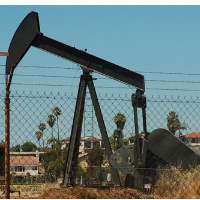State Regulators “Listening” while Energy Companies Are Fracking
 Oil drilling in Baldwin Hills.
Oil drilling in Baldwin Hills.
After failing to pass legislation to control the controversial method of oil and gas extraction called hydraulic fracturing, or “fracking,” the state decided instead to conduct a listening tour to catalog complaints of residents around the state.
The seven-session series of meetings, conducted by the Department of Conservation, drew the scorn of environmentalists and community activists who would like to see a moratorium on the drilling procedure, but would probably settle for legislation that lets people know where energy companies are fracking and what chemicals are being pumped into the ground.
So far, the fourth largest oil-producing state in the nation has been content to let oil companies sporadically self-report on their fracking activities. The Western States Petroleum Association released a membership survey in May that indicated fracking was used at 628 California wells in 2011.
The tour included stops in Bakersfield, Ventura, Culver City, Santa Maria, Long Beach and Salinas. Its final stop was July 25 in Sacramento.
SB 1054 would have been a modest first legislative step, but the bill died in the Senate two months ago. It would have required energy companies to notify property owners when they were about to drill near their homes. Legislation that would have required companies to disclose what chemicals they pump into the ground, and perhaps into the groundwater, died last year. At least nine other states have similar legislation.
Fracking requires the use of powerful pumps to force a pressurized mix of water and chemicals deep into layers of shale, causing fractures and allowing the extraction of otherwise unavailable natural gas or oil.
The 300,000 people (200,000 of whom are non-white) who are clustered around the nation’s largest urban oil field, in Los Angeles County’s Baldwin Hills, had no idea until recently that Plains Exploration and Production (PXP) was conducting fracking tests on its 1,000-acre site that is home to hundreds of oil wells.
Critics say fracking has been linked to groundwater contamination, air pollution, releases of methane gas, micro-earthquakes and sink holes.
Halliburton Co.. whose former CEO was ex-Vice President Dick Cheney, convinced Congress to exempt fracking from regulation under the Clean Drinking Water Act in 2005. The company was a fracking pioneer in the 1940s. Fracking is used across the country and its use has become controversial in natural gas-producing regions in Pennsylvania, Ohio and New York.
–Ken Broder
To Learn More:
California Regulators Take Heat over Fracking (by Michael J. Mishak, Los Angeles Times)
Is Baldwin Hills “Fracking Up”? (by Merdis Hayes, Our Weekly)
California Senate Rejects “Fracking” Legislation (by Michael J. Mishak, Los Angeles Times)
Fracking Goes to the Big City … Los Angeles (by Matt Bewig, AllGov)
Let's Close the Information Gap about Fracking (by Michael Hiltzik, Los Angeles Times)
Firms Step Up Fracking Disclosure; Activists Want It Banned (by Michael J. Mishak, Los Angeles Times)
- Top Stories
- Controversies
- Where is the Money Going?
- California and the Nation
- Appointments and Resignations
- Unusual News
- Latest News
- California Forbids U.S. Immigration Agents from Pretending to be Police
- California Lawmakers Urged to Strip “Self-Dealing” Tax Board of Its Duties
- Big Oil’s Grip on California
- Santa Cruz Police See Homeland Security Betrayal in Use of Gang Roundup as Cover for Immigration Raid
- Oil Companies Face Deadline to Stop Polluting California Groundwater





